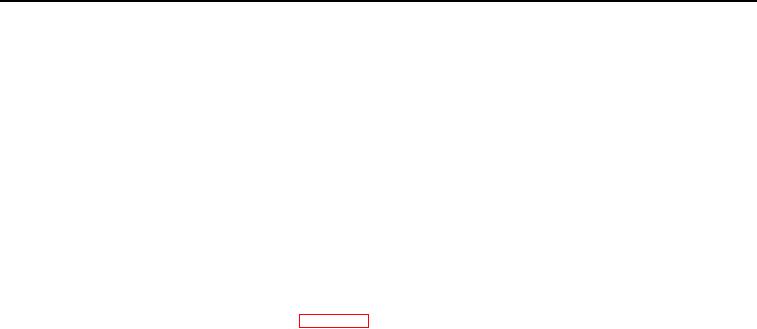
TM 5-3990-263-13&P
0034
GENERAL MAINTENANCE PROCEDURES
While conducting PMCS, perform the following general maintenance procedures as required:
a. Cleanliness. Dirt, grease, oil, and debris only get in the way, conceal problems and may in fact
cause a serious problem. Clean all metal surfaces and grease fittings.
b. Bolts, nuts, and screws. Ensure they are not loose, missing, bent, or broken. Report loose or
missing bolts, nuts, and screws to Field maintenance.
c. Welds. Inspect for gaps where parts are welded together. Check for loose or chipped paint, rust,
and cracks. Report bad welds to Field maintenance.
d. Hydraulic lines and fittings. Inspect for wear, damage, and leaks. Carefully inspect winch
hydraulic lines in area of winch frame to ensure lines have not chafed during operation. Ensure
fittings are tight. A stain around a fitting or connector can mean a possible leak during operation.
Report any damage, leaks, or loose fittings to Field maintenance.
e. Air system components. Inspect for wear, damage, and leaks. Ensure clamps and fittings are
tight. Report any damage, leaks, or loose fittings to Field maintenance.
Ensure components are adequately lubricated. (WP 0070) Inspect all grease fittings and ensure rollers are operating
freely. Report any problems to Field maintenance for correction. Once a week or every 50 hours of operation,
whichever occurs first, use an oil can to lubricate all pivots, shackles, screw threads, hinges, and other components
that require lubrication but are not provided with lubrication fittings.
All defects that operator cannot fix must be reported on a DA Form 2404 or DA Form 5988-E immediately after
completing PMCS. If a serious problem is found, IMMEDIATELY report it to your supervisor.
Extreme weather conditions, periods of high use, or combat conditions may dictate that PMCS procedures be
performed more often than required in PMCS table.
LEAKAGE DEFINITIONS
It is important to know how fluid leakage affects the BAP status. The following are types/classes of leakage an
operator must know to determine if BAP is mission capable. Learn these leakage definitions. When in doubt, notify
your supervisor.
a. Class I. Seepage of fluid (as indicated by wetness or discoloration) not great enough to form drops.
b. Class II. Leakage of fluid great enough to form drops, but not great enough to cause drops to drip
from item being inspected.
c. Class III. Leakage of fluid great enough to form drops that fall from item being inspected.
Equipment operation is allowed with minor (Class I or Class II) leakages. Fluid levels in an item/system affected with
such leakage must be checked more frequently than required in PMCS. When in doubt, notify your supervisor.
Report Class III leaks IMMEDIATELY to your supervisor or Field maintenance.
END OF WORK PACKAGE
0034-2
03/15/2011Rel(1.8)root(pmcsintrowp)wpno(I04001)

